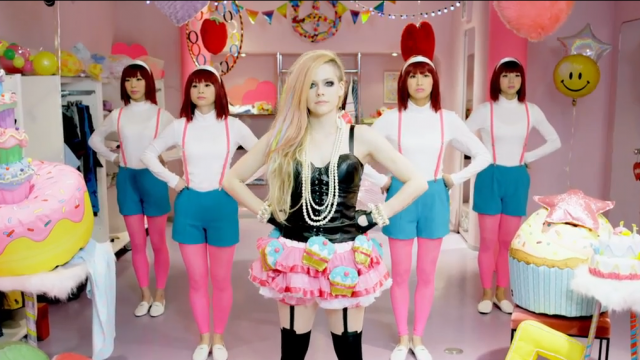Yesterday, Avril Lavigne released the music video to her new single “Hello Kitty” on YouTube, but in a blink of an eye it was removed. Billboard called the video an “embarrassment in any language” and Entertainment Weekly claimed that there “are serious questions about whether it’s offensive.”
Why?
Well it may have a thing or two to do with all the cultural appropriation. Lavigne’s video includes all things stereotypically Japanese — sushi, Japanese schoolgirls, bright pink colors and even expressionless Asian back up dancers. Throughout the video, Lavigne throws out Japanese words like “arigato” and “kawaii.” That’s right. Her lyrics are actually “Thank you! Cute! Cute!” Apparently, there’s no need to have lyrics that make sense as long as you blurt out the most stereotypical Asian words you know.
As you can expect, audiences are torn. Loyal Avril fans have stood by her side and see nothing wrong with the video. Fans on her official website are claiming that “Hello Kitty” is far from offensive. In fact, they believe that the video should be praised for “doing something different.”
[wp_ad_camp_1]
Of course, even more people are arguing that Lavigne’s cultural appropriation is far from new and different. We saw this with Gwen Stafani’s “Harajuku Girls,” with Katy Perry’s Geisha performance and especially in Alison Gold’s infamous “Chinese Food” video.
For loyal fans who are confused, the reason people hate Avril’s “Hello Kitty” is because it uses Asian culture as a prop. Even the expressionless back up dancers are simply a backdrop. There is a very big difference between embracing a culture and using it as an accessory. It is not appreciation to trivialize an entire way of life.
As Huffington Post explains, “Borrowing from another culture is most problematic when it plucks from a minority group (especially one that has been exploited or otherwise oppressed). Using aspects of another culture from a position of privilege is a means of additional exploitation in that it disregards the shared experiences that led to the development of the culture in question and uses ideas and traditions for their benefit.”
The video was removed from YouTube, but check it out here and tell us what you think.
[wp_ad_camp_3]






